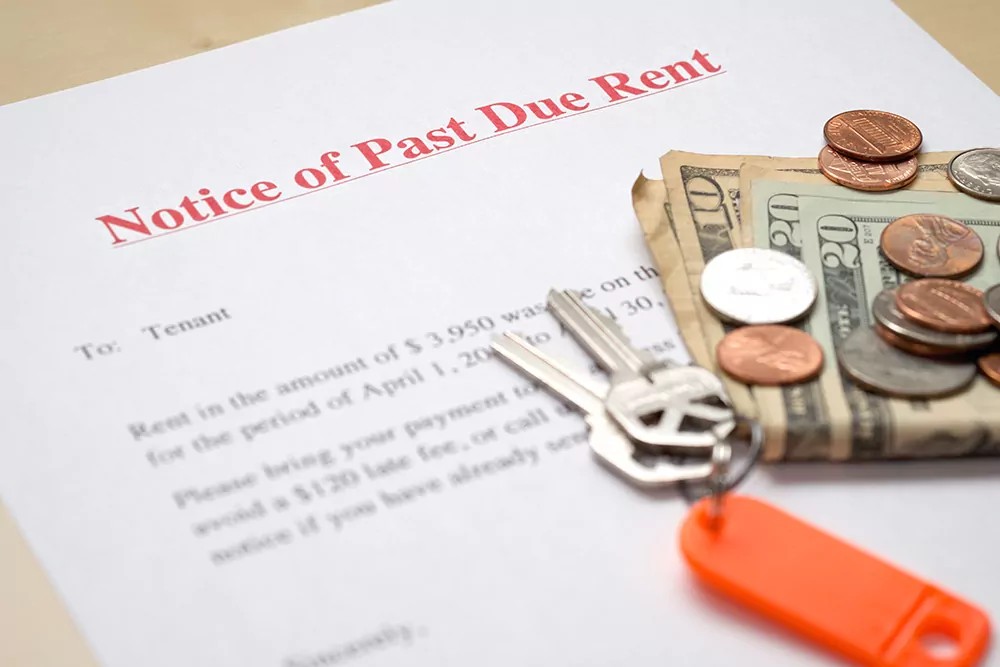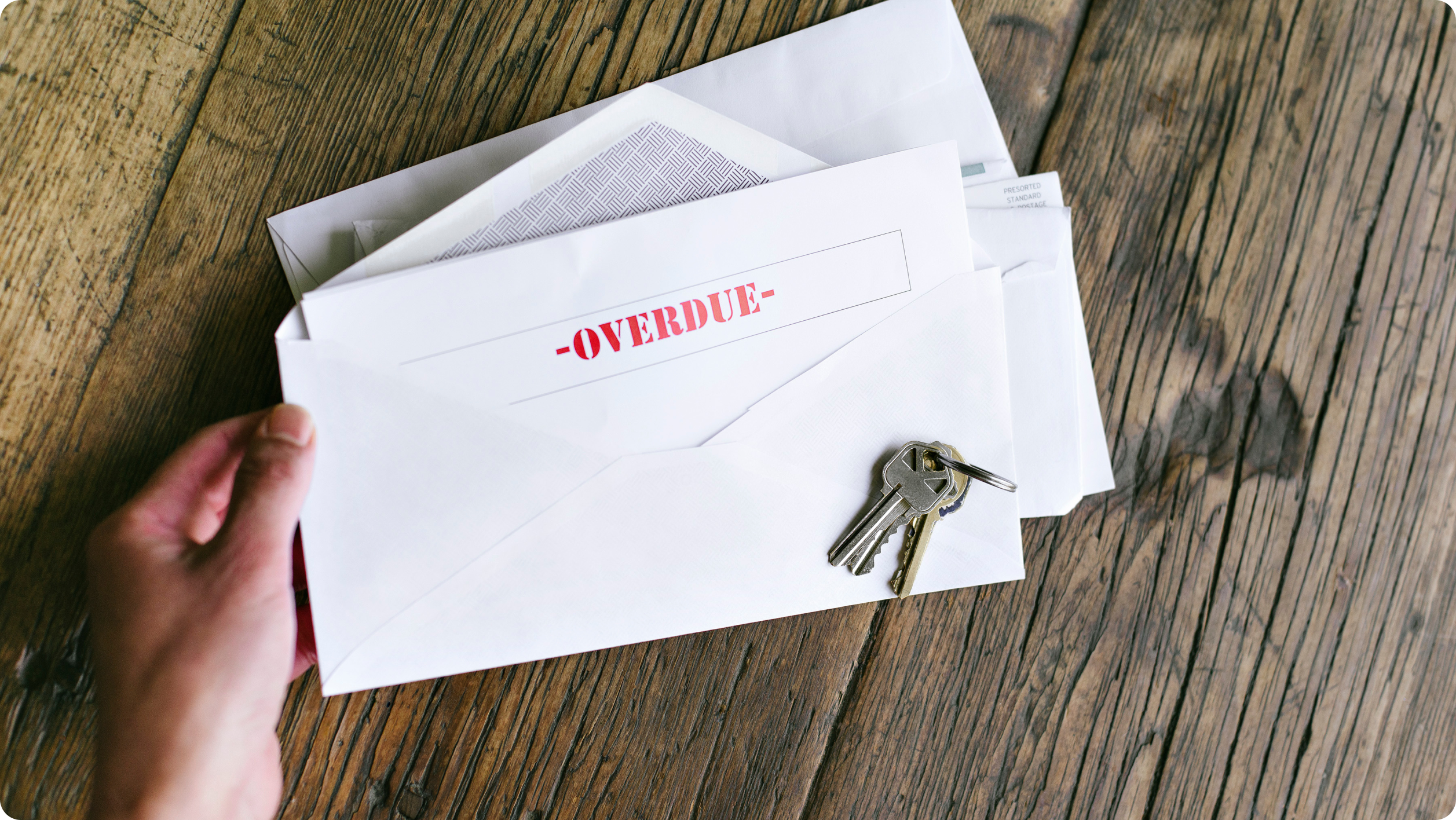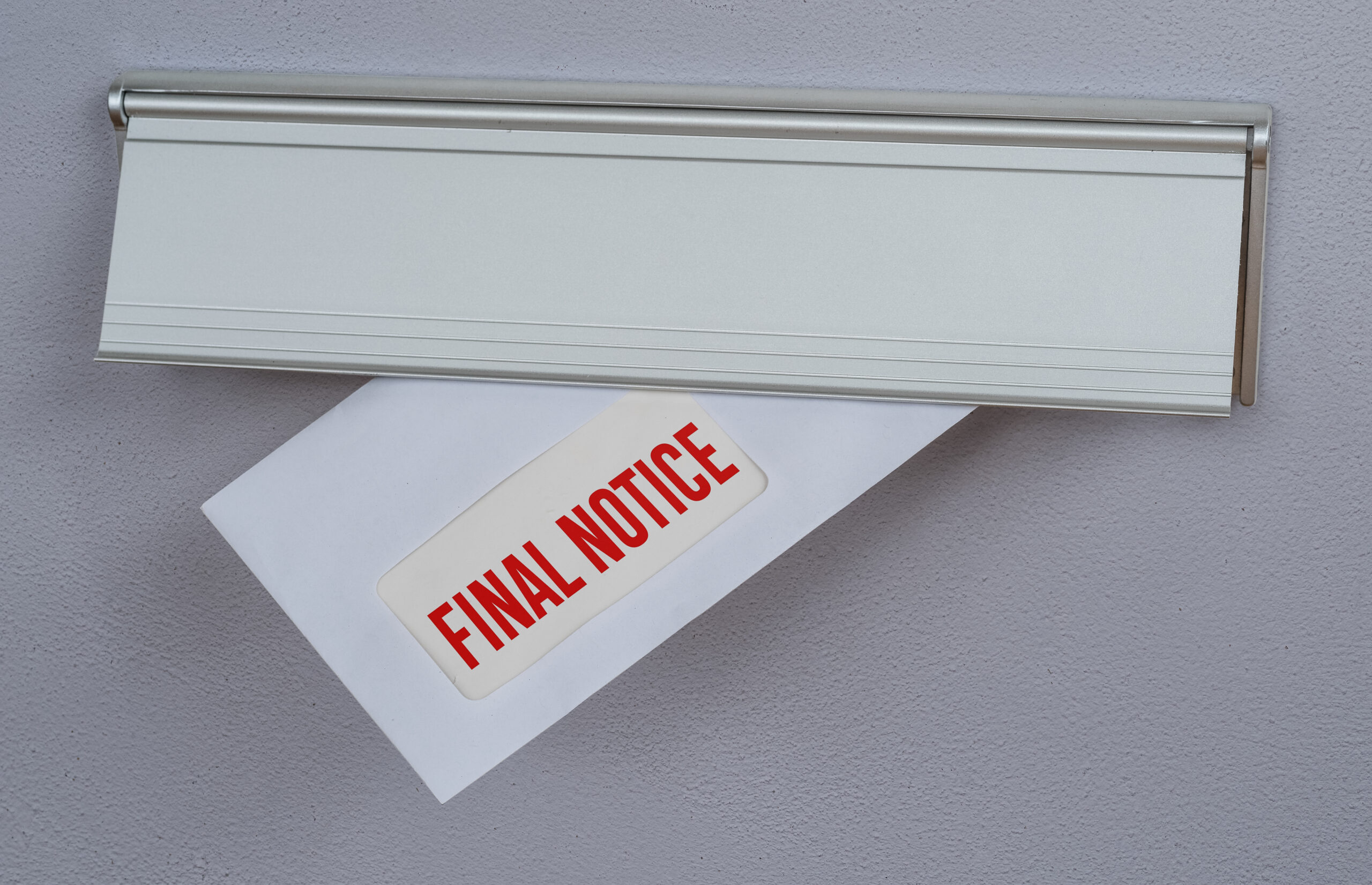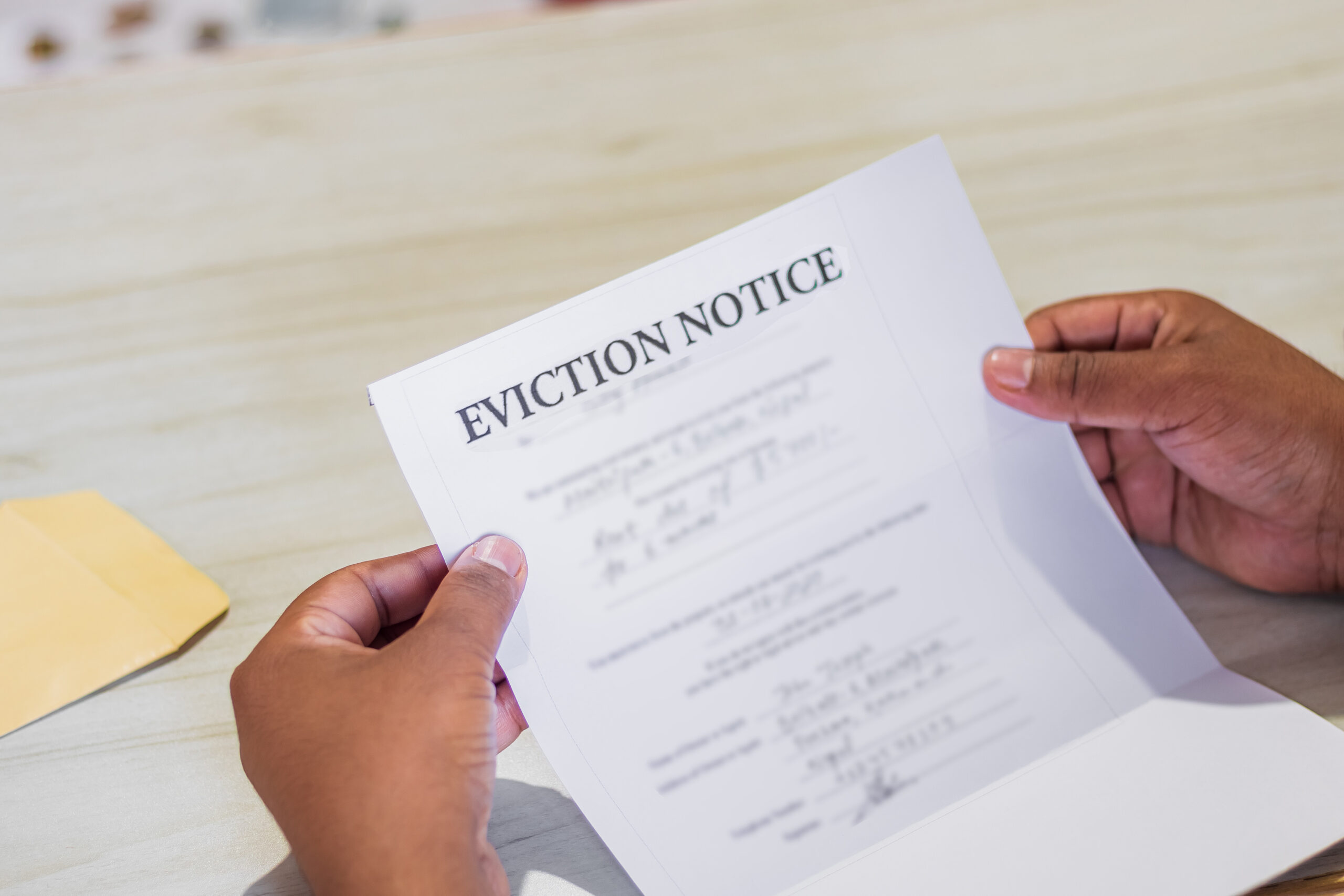One of the most common disputes between landlords and tenants is late rent payments. Regardless of the reason for overdue rent, it’s vital to enforce the terms of rent collection in the lease agreement tenants signed by sending a late rent notice.
In this article, we’ll review what a late rent notice is, how it works and provide some tips on how to avoid late rent plus a free late rent notice template.
Key takeaways:
- A late rent notice is a formal written document notifying tenants of overdue rent.
- Landlords should issue notices as soon as rent is overdue, following any grace periods outlined in the lease or mandated by state laws (usually 2 to 5 days).
- Tenant late rent notices should include their name and address, overdue rent amount (including fees), and payment deadline.
- Use certified mail, email, or in-person delivery when sending a late rent notice, and keep a record of delivery for legal purposes.
- Avoid late rent payments by thoroughly screening tenants, setting clear lease terms, and using online rent collection tools like Baselane to automate payments and reminders.
What is a late rent notice?
A late rent notice is a written letter to notify their tenants that their rent is past due. Sometimes this notice is called a Notice to Pay Rent, Failure to Pay Rent Notice, Demand for Payment, and Notice to Cure.
This isn’t an eviction notice; it’s a step to prevent escalation. The purpose of a late rental payment notice is:
- Formal notification: Alerts tenants about their overdue rent.
- Legal record: Provides written proof of communication in case tenants continue to default on rent payments.
- Prompts payment: Encourages tenants to pay the outstanding rent before additional penalties apply.
Sometimes it can be a genuine mistake. After all, everyone can forget a payment now and then, so the late rent notice might just be a necessary kick for your tenants to avoid paying rent late again.
What to include in a late rent payment notice
In general, this is what to include in a late rent notice letter:
- Tenant’s name and contact information: To ensure the notice is directed to the correct individual(s).
- Rental property address: Specify the unit the letter refers to.
- Date of notice: Record when the notice is issued.
- Overdue rent amount: Clearly state the total rent due, including any unpaid balances.
- Due date for payment: Provide a deadline for the tenant to pay the overdue rent.
- Late fees: Include applicable late fees as outlined in the lease agreement.
- Consequences of non-payment: Detail what actions will follow if rent is not paid, such as filing for eviction.
- Landlord’s contact information: Make it easy for tenants to communicate
How to write a late rent notice
When writing a late rent notice, it’s important to be clear, concise, and firm. Whether you’re sending a friendly reminder or escalating the issue, a well-structured notice helps maintain professionalism while protecting your legal standing. Below are a few tenant late rent notice examples.
Late Rent Payment Notice Sample
[DATE]
[TENANT NAME]
[PROPERTY ADDRESS]
Dear [TENANT NAME],
This letter is a formal notice of unpaid rent due for [PROPERTY ADDRESS]. As of [DUE DATE], the monthly rent amount of [RENT AMOUNT] is past the grace period outlined in the lease agreement and considered past due.
For that reason, you’re responsible to cover both the rent and fees outlined below:
[RENT AMOUNT]
[LATE FEE AMOUNT]
[TOTAL AMOUNT OWED]
Failure to pay the total amount owed by [PAYMENT DEADLINE] may result in legal action being initiated against you. If you’ve already submitted the required payments, please disregard this letter.
Sincerely,
[LANDLORD NAME]
[CONTACT INFORMATION]
Reminder Overdue Rent Notice Sample
[DATE]
[TENANT NAME]
[PROPERTY ADDRESS]
Dear [TENANT NAME],
This is a formal notice regarding your overdue rent for [MONTH]. Despite previous reminders, your payment of [RENT AMOUNT] has not been received. Late fees of [LATE FEE AMOUNT] have also been applied, bringing your total balance to [TOTAL AMOUNT].
Please submit the full payment by [PAYMENT DEADLINE] to avoid further action, including legal proceedings. Contact me immediately if you wish to discuss payment options.
Sincerely,
[LANDLORD NAME]
[CONTACT INFORMATION]
Final Past Due Rent Notice Sample
[DATE]
[TENANT NAME]
[PROPERTY ADDRESS]
Dear [TENANT NAME],
This letter serves as a final notice for your unpaid rent for [MONTH]. As of today, your total balance is [TOTAL AMOUNT], including [LATE FEES].
If full payment is not received by [FINAL DEADLINE], I will have no choice but to initiate eviction proceedings as outlined in our lease agreement and state law. Please contact me immediately if you wish to resolve this matter.
Sincerely,
[LANDLORD NAME]
[CONTACT INFORMATION]
While you may not be obligated to send multiple notices, doing so can demonstrate goodwill and provide a clear record of your attempts to resolve the issue. If a tenant fails to pay after receiving a late rent notice, the next step is typically to issue a notice to pay or quit.
Preventing late rent payments is more effective than managing them. The best rent collection apps automate rent payments and reminders to help keep tenants on track.
Put Rent Collection on Autopilot
Get paid on time with automated rent payments, reminders, and late fees.
Legal guidelines for late rent notices
Most states have specific rules for how to collect unpaid rent. Key legal considerations include:
- Grace period requirements: Many states mandate grace periods before landlords can send a delinquent rent notice or charge late fees. Maine requires a 15-day grace period before rent is considered late.
- Delivery methods: Some states specify how to deliver late rent notices. For example, New York requires a written rental arrears letter to tenants delivered by certified mail every time rent is more than five days late.
- Charging late fees: In Virginia, late fees are limited to 10% of monthly rent or the remaining balance (whichever is lower) after a 5-day grace period.
- Documentation: Retain copies of all notices and proof of delivery, as these are essential if the situation escalates to legal proceedings.
- Eviction process guidelines: Certain states, like Florida, require landlords to send multiple notices before filing for eviction, while others allow immediate escalation after a single notice.
It’s important to note that accepting partial payments may impact the eviction process. In some states, you have to start the process of evicting a tenant all over again if you accept a partial payment for overdue rent.
How to send a late rent notice?
Common delivery options for a written late rent notice include:
- Certified mail: Provides proof of delivery and is often required by law.
- Email: Attach the notice as a PDF and request confirmation of receipt.
- In-person delivery: Ensure the tenant receives the notice directly.
Some states let you leave the notice at the property, so long as it’s clearly visible. Keep copies of all notices and proof of delivery for your records. Also, make sure your certified mail receipt, email, or signed notice includes the date the overdue rent notice was issued to prove it was sent within the legal notice period.
When to send a late rent notice
The timing for sending a late rent notice depends on where your property is located and what your lease says. Generally, you’ll need to provide notice of late rent in these situations:
- After late payment: Send a notice as soon as a rent payment is overdue if you’re legally allowed.
- After grace period ends: If your state or lease agreement includes a grace period (usually 2 to 5 days), send the notice immediately after it passes.
- After partial payment: If a tenant pays less than the full rent amount, issue a notice for the remaining balance.
Check local regulations to make sure you follow the notice requirements. For example, Texas mandates a minimum 3-day grace period for late rent, while states like California and Florida generally allow landlords to send a notice immediately after rent is overdue.
What is a reasonable late fee?
The amount you can charge as a late fee depends on state laws. Many states specify that late fees must be “reasonable” or set a maximum percentage of the monthly rent (usually between 5% and 10%). For example:
- California: Allows landlords to charge a late fee that is a reasonable estimate of the costs incurred due to the delay, often around 5% of the monthly rent.
- Florida: Permits late fees of $20 or 20% of the monthly rent, whichever is greater.
- Texas: Late fees are capped at 12% for properties with four or fewer units and 10% for those with more than four.
Keep in mind that high late fees can backfire. Some tenants won’t have the money to pay a high late fee on top of their overdue rent. Pricey late fees can also leave a bad taste in the tenant’s mouth, deterring them from renewing their lease (if that’s what you want).
How to avoid late rent payments
The best way to handle late rent payments is to put steps in place to avoid them in the first place, which can include:
- Screen tenants thoroughly: Use a rental application form and a tenant screening service to verify employment, rental, credit, and criminal history.
- Set clear lease terms: Include specifics about rent due dates, grace periods, and late fees.
- Make paying rent easy: Encourage tenants to set up auto-pay to avoid missing payments and late fees.
- Automate rent reminders: Use rent collection tools like Baselane to send automated reminders before rent is due.
- Offer multiple payment options: Let tenants pay rent with a credit card, debit card, or ACH bank transfer.
Keep the lines of communication open. Encourage tenants to reach out if they think they might have trouble paying rent on time. This way, you can work on finding solutions together before the due date – it’s a win-win for everyone!
Automate rent collection with Baselane
Baselane’s online rent collection is one of the easiest ways to help prevent overdue payments. Tenants can make one-time or automated payments via ACH or card from any device deposited directly into your account.
Unlike payment apps, like Venmo or Cash App, Baselane automatically sends reminders and charges late fees to help keep tenants on track. Payment history and outstanding rent are all documented, so you don’t have to worry about losing records.
Create a free account to start collecting rent payments and other rental fees with Baselane today.
FAQs
Generally, rent is considered late one day following its due date. However, some states will make exceptions for any delay in the payment delivery, such as late mail delivery or holiday. State or local laws may also give tenants a grace period, generally ranging between 2 to 5 days. The terms of late rent should be clearly outlined in your lease agreement.
Most states allow evictions for overdue rent payments unless there’s an eviction moratorium order. The eviction timeline will depend on your local laws. Once you remind the tenant that rent is overdue, they must pay the rent in full before the grace period ends.
If the tenant still hasn’t paid by the due date specified in the late rent notice, the landlord can file for eviction with the local court and begin the eviction process.
Depending on state laws, it’s acceptable to charge the tenant a “reasonable” late fee. Tenants who make a habit of paying their rent late affect your cash flow, so late fees help offset any costs incurred and incentivize the tenant to pay rent on time.
If you’re going to charge a late rent fee, be sure the terms are laid out in the lease. You’ll also need a record of late payments as proof of unpaid rent. Payment tracking can be done manually using a fillable rent ledger or rent roll template. Online collection techniques (like Baselane) can automate rent invoices, late fees, and tracking, saving you hours of admin.
If tenants refuse to pay late fees, review your lease agreement to ensure the late fee is clearly outlined and enforceable under local laws. Send a rent overdue notice stating the overdue amount, including both rent and late fees.
If they still refuse, consider legal recourse, such as filing for eviction. Check local laws to make sure you’re in compliance with state regulations.
A late rent notice is an initial reminder that rent is overdue and requests payment before further action is taken. A 3-day pay or quit notice is a formal legal document notifying the tenant that they must pay rent within three days or vacate the property. The latter is often the first step in initiating the eviction process, depending on state laws.
Avoid getting these mixed up by downloading our late rent notice template PDF free sample.
To write a past-due rent letter:
- Include the date of the notice.
- State the tenant's name and rental property address.
- Specify the overdue amount, original due date, and any applicable late fees.
- Provide a deadline for payment to avoid further action.
- Detail potential consequences for non-payment, such as legal action or eviction.
- Download a free printable late rent notice template for easy customization.
The best way to collect rent and avoid late payments is by using automated systems like Baselane Online Rent Collection. Automated reminders, flexible payment options (e.g., ACH or card), and direct deposit tracking make it easier for tenants to pay on time. Additionally, Baselane automatically applies late fees and keeps comprehensive payment records.
Yes, landlords can accept partial rent payments, but doing so can complicate the eviction process in some states. If you accept a partial payment, clearly document the amount received and the remaining balance. It’s best to review local laws to ensure accepting partial payments doesn’t waive your right to pursue legal action for the overdue amount.







